[GSE2024] Forum on Mental & Physical Health: Supporting Personal Development of Adolescents Held in Beijing
date:2024-08-27 13:43author:adminsource:Smart Learning Instituteviews:
The GSE2024 Forum on Mental & Physical Health: Supporting Personal Development of Adolescents was held at Beijing Normal University on the afternoon of August 18. The issue of physical and mental health among adolescents has garnered widespread concern from schools, families, and society. The cultivation of students’ ideals and beliefs, moral character, intellectual and knowledge capabilities, as well as physical and psychological qualities, is indispensable. The application of intelligent technology helps in perceiving the physical and mental health status of students, exploring the laws of student growth, and promoting the personalized and comprehensive development of adolescents. This forum brought together experts, scholars, and frontline teachers from home and abroad to discuss the growth patterns and talent development mechanisms of the digital generation; the assessment and intervention of adolescents’ physical and mental health; psychological health education and counseling services; cognitive safety, special education, digital moral education, labor education, smart physical education, and smart aesthetic education, among other topics.
Mr. YANG Dayan, Deputy Director of the Department of Physical, Health and Arts Education, Ministry of Education, P. R. China, noted that the Report to the 20th National Congress of the Communist Party of China explicitly set the objective of becoming a leading country in education and health by 2035, an objective that highlights the importance of psychological and mental health. The year 2024 was designated the Year for Promoting Student Physical and Mental Health. This was a major move by the Chinese government to become a leading country in education. To empower mental health services for adolescents, the Ministry of Education (MOE) adopted a range of policies and actions, including the nationwide Mental Health Awareness Month campaign, the diffusion of knowledge about mental wellbeing, the offering of the National Student Mental Health Lectures and the application of intelligent technologies. Mr. YANG said that the MOE would take further the idea that health comes first, and advocate the health concept of “body and mind as one” by taking digital means to boost the coverage and quality of mental health education, improving the Smart Education of China platform, expanding the provision of resources for physical, arts and health education, and leveraging big data and AI technologies to strengthen research on and early intervention in the psychological health issues of students.
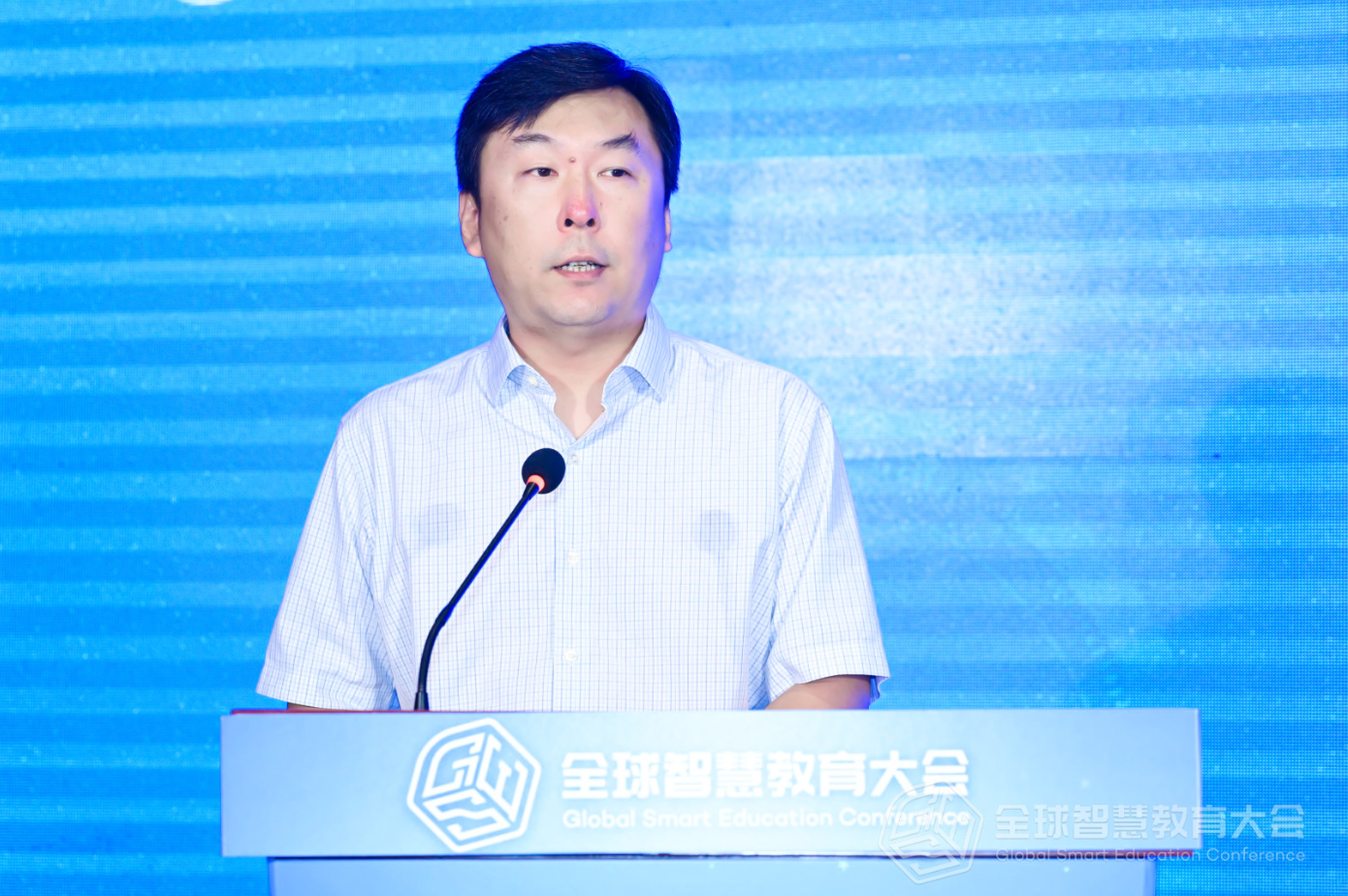
Mr. YANG Dayan, Deputy Director, Department of Physical, Health and Arts Education, Ministry of Education, P. R. China
In the speech, H.E. Ms. KILO Vivian ASHERI, Secretary of State of the Ministry of Basic Education, The Republic of Cameroon, stressed the impacts of cultural diversity on adolescent mental health education. She noted that Cameroon had rich cultural and racial backgrounds, which posed distinct challenges to the educational system, especially in addressing the psychological issues of adolescents. Ms. ASHERI briefed the audience on Cameroon’s initiatives to improve the physical and mental health of students, including adjusting the curriculum structure, providing nutrition support, and reinforcing mental health education. She emphasized that games and sports played an important role in boosting student mental health, and called for more attention and support from the international community to efforts made by African countries in education and mental health.
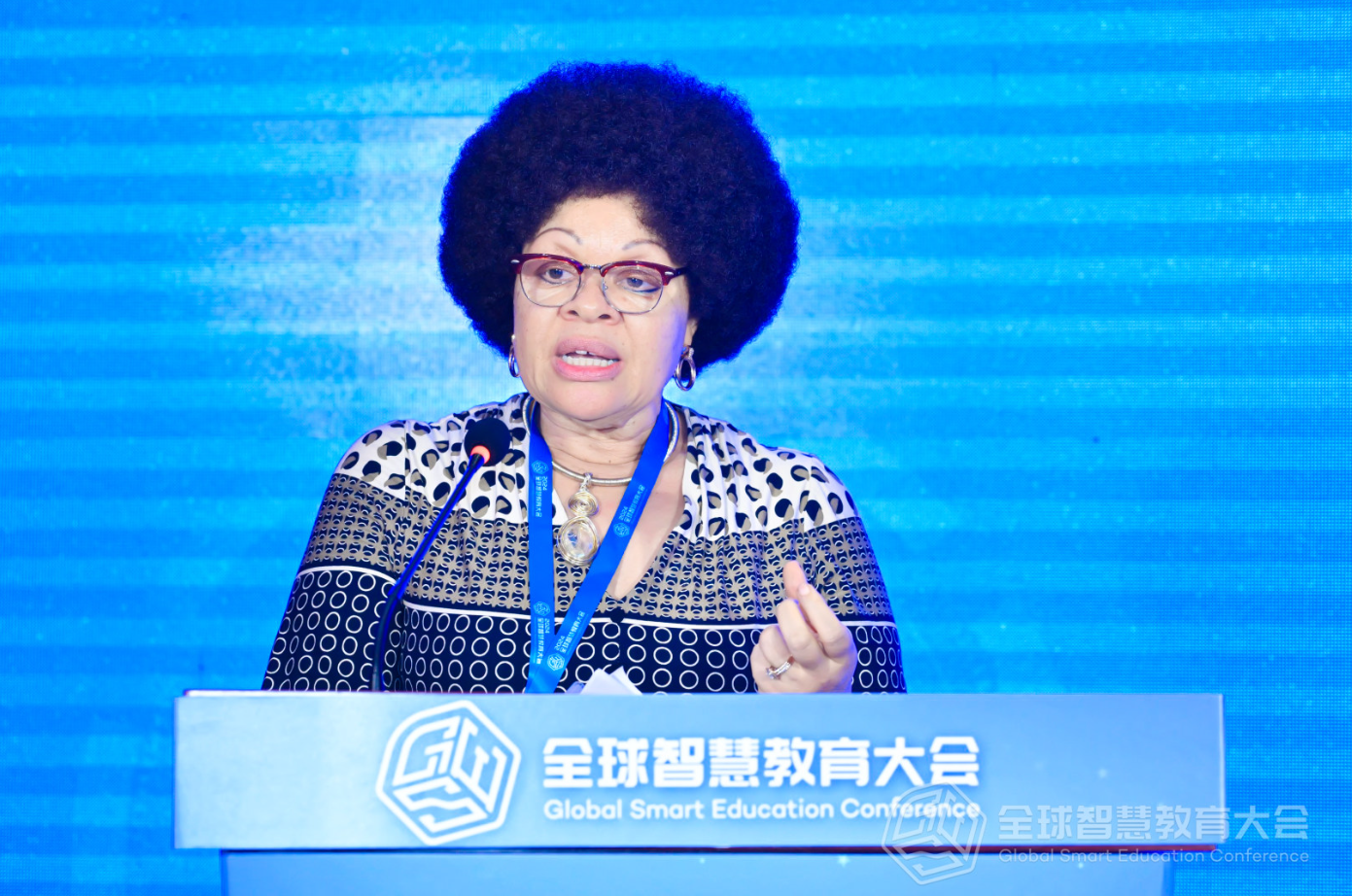
H.E. Ms. KILO Vivian ASHERI, Secretary of State, Ministry of Basic Education, The Republic of Cameroon
Ms. Dorothy Gordon, Former Chair of the Information for All Programme (IFAP), UNESCO, pointed out in her speech that developments in global digitalization had far-reaching impacts on adolescent mental health. She called on the international community, especially communities and families, to make concerted efforts to prioritize considerations regarding the physical and psychological well-being of adolescents when promoting digital solutions.
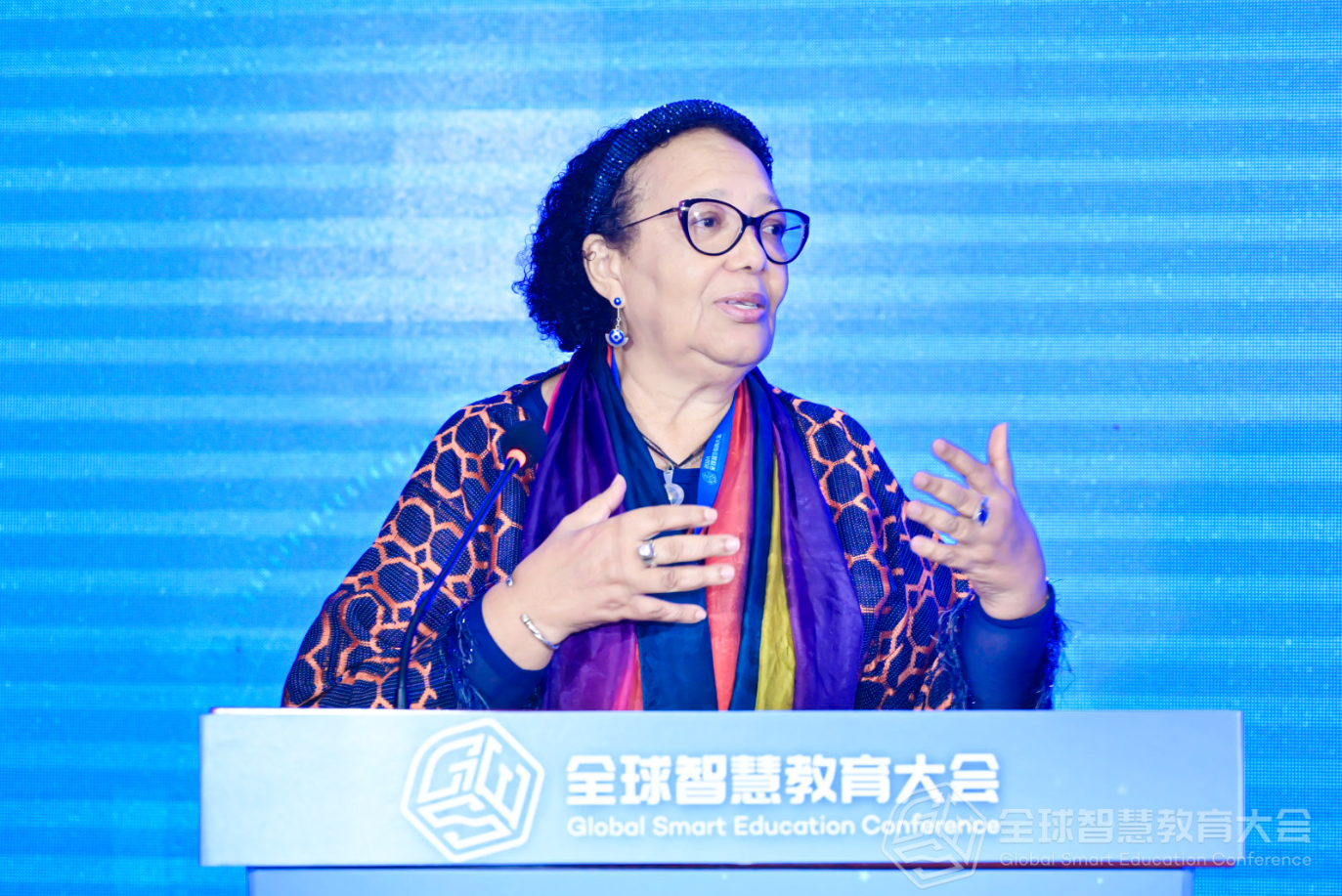
Ms. Dorothy Gordon, Former Chair, Information for All Programme (IFAP), UNESCO
International Approaches to Mental Health of Adolescents Discussed from a Global Perspective
At the Keynote Speeches session, Prof. Obijiofor Aginam, Director of UNESCO Mahatma Gandhi Institute of Education for Peace and Sustainable Development (MGIEP), gave a speech titled Supporting Personal Development of Adolescents In the Digital Age—Lessons Learnt from COVID-19. He suggested that the educational system build its capacity in addressing students’ psychological issues, and help make adolescents more resilient psychologically through mental health education, on-campus counseling services, and courses on life skills.
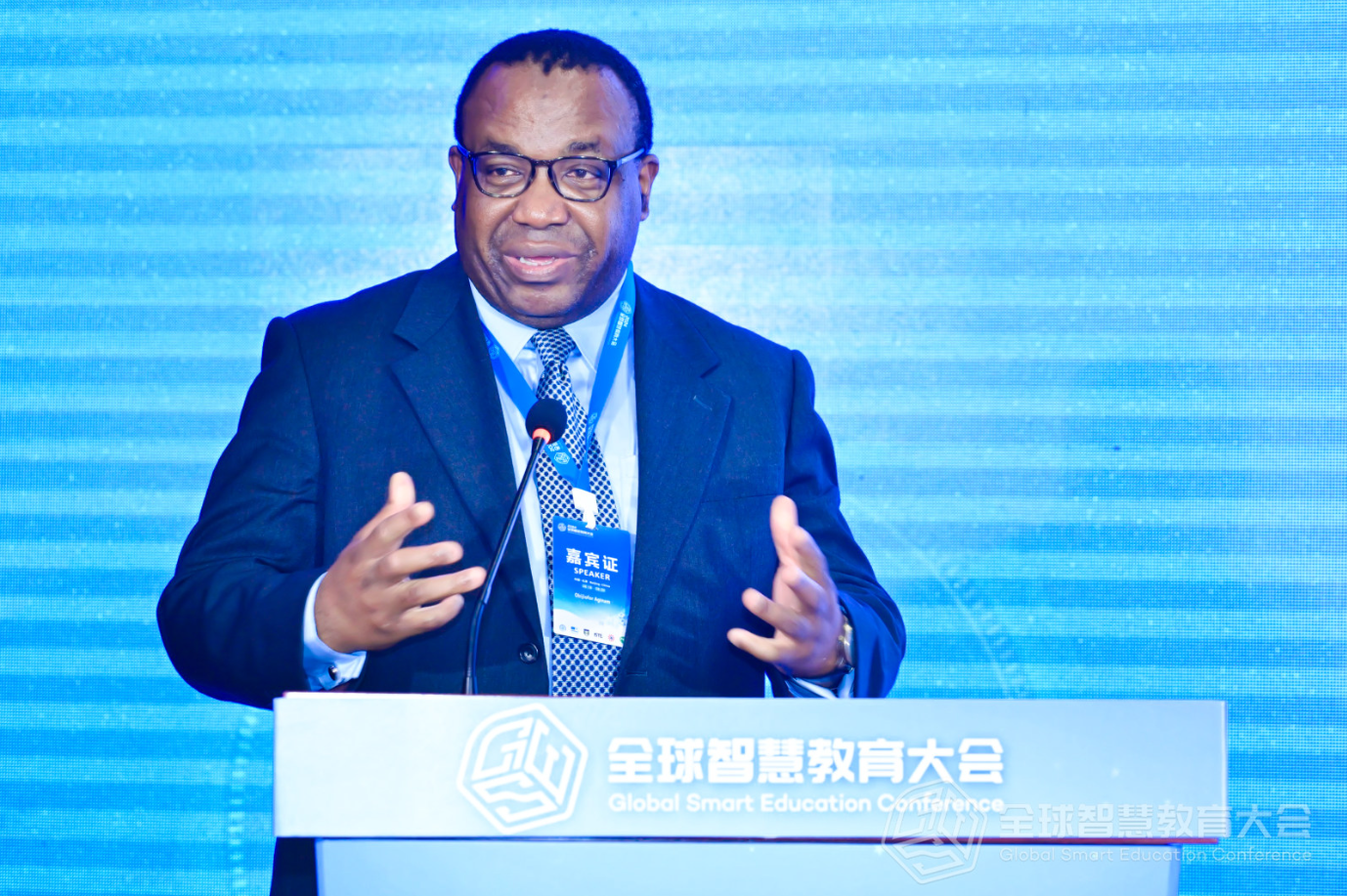
Prof. Obijiofor Aginam, Director, UNESCO Mahatma Gandhi Institute of Education for Peace and Sustainable Development (MGIEP)
Prof. QIAO Zhihong from Faculty of Psychology, Beijing Normal University, delivered a speech titled Challenges and Countermeasures for Student Mental Health in China. Prof. QIAO noted that a two-pronged approach should be adopted to boost the mental health of primary and middle school students: one is to improve their living environments so that they meet the essential needs of mental health; the other is to strengthen mental health education to enable students to better cope with stress. He underlined that schools, families, and society should work together to create loving and supportive growth environments for students, and help them gather positive growth experiences and reduce negative emotions.
Prof. Didier Jourdan, Head of the WHO Collaborating Center for Research in Education & Health, held that smart learning had mixed impacts on the development of children and adolescents, so due attention should be given to the positive role of relevant technologies in cultivating values and social morality. He noted that adolescents were a key force in meeting such challenges, so we must create supportive living environments and build health learning pathways through education, community services, and cross-department collaboration, as well as ensure that policies are inclusive and sustainable, thus effectively enhancing the wellbeing and health of adolescents.
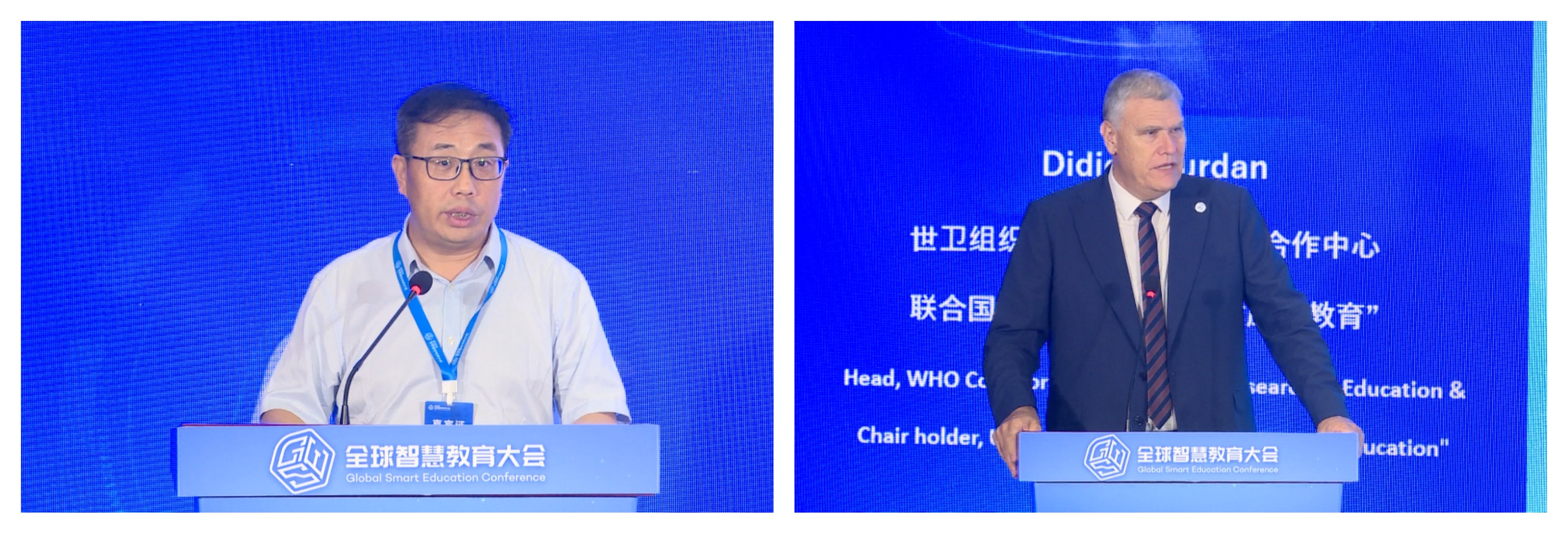
Prof. QIAO Zhihong, Faculty of Psychology, Beijing Normal University (Left)
Prof. Didier Jourdan, Head, WHO Collaborating Center for Research in Education & Health (Right)
Prof. MAO Lijuan, President of Shanghai University of Sport, gave a speech titled Exploration and Practice of Smart Sports on Promoting Adolescent Physical and Mental Health. She talked about how smart sports improve the physical and mental health of adolescents through the application of digital and intelligent technologies. She emphasized that smart sports could not only improve the physical activity levels of adolescents, but also provide personalized health guidance via smart wearables and virtual training systems. Prof. MAO expected that, in the future, smart sports could play a key role in promoting physical education for and mental health of adolescents.
Mr. ZHANG Xiaodong, Deputy Dean of Jiangsu Academy of Educational Sciences, presented a report titled Nurturing the Mind Campaign—A Novel Practice of Jiangsu in Mental Health Education. He shared the innovative initiatives taken and results achieved by Jiangsu Province in mental health education for adolescents, especially the five major strategies under the Nurturing the Mind Campaign, i.e., target-setting, specialized team building, a focus on key students, a sound four-in-one working system, and policy implementation for effectiveness.
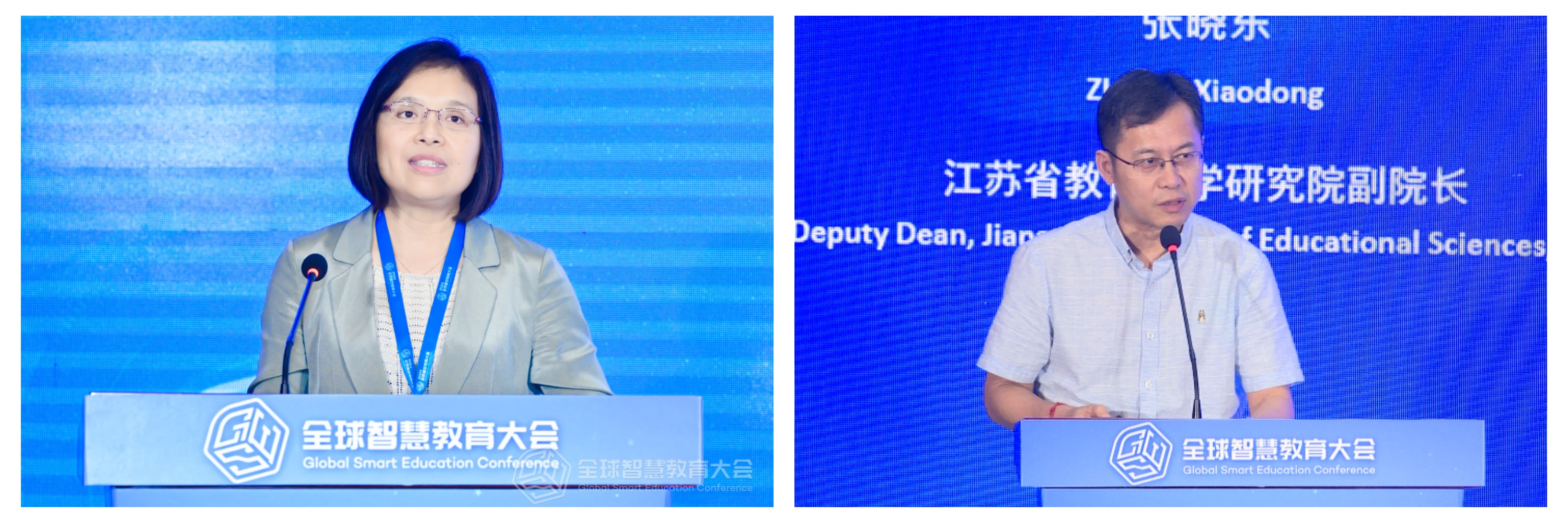
Prof. MAO Lijuan, President, Shanghai University of Sport (Left)
Mr. ZHANG Xiaodong, Deputy Dean, Jiangsu Academy of Educational Sciences (Right)
Intelligent Technology for All-round Development of Adolescents
At the Outcome Release session, Mr. NAN Hao, CEO of Beijing Normal University · Jingshi Ruidao, released a report on the latest practice results titled Practice of Building a Tiered Intervention System for Adolescent Mental Health Based on Multimodal Integration. He said that Jingshi Ruidao, a state-owned tech company incubated at Beijing Normal University (BNU), had presented Xiaorui, a first-of-its-kind application of a multimodal intelligent agent in the vertical field of mental health, after three years of research in partnership with the Faculty of Psychology and Faculty of Education at BNU and the Institute of Computing Technology, Chinese Academy of Sciences (ICT), among other institutions. Mr. NAN noted that this app values interaction and collaboration with external environments, people, and other intelligent agents, which makes it more human-like in decision-making, giving it the ability to understand and analyze the environments where it operates. He predicted that the app was likely to make breakthroughs in high-order capabilities, including virtual counseling, aided assessment, and emotional companionship.
Prof. Srdjan Dusanic, Dean of the Faculty of Philosophy, University of Banja Luka, Bosnia and Herzegovina, delivered a speech titled Advancing Holistic Adolescent Development through Smart Technologies. He briefed the audience on the positive and negative impacts of smart technologies on adolescents, and analyzed how such technologies could be used for health assessment and intervention and mental health education in a way that advances the holistic development of adolescents.
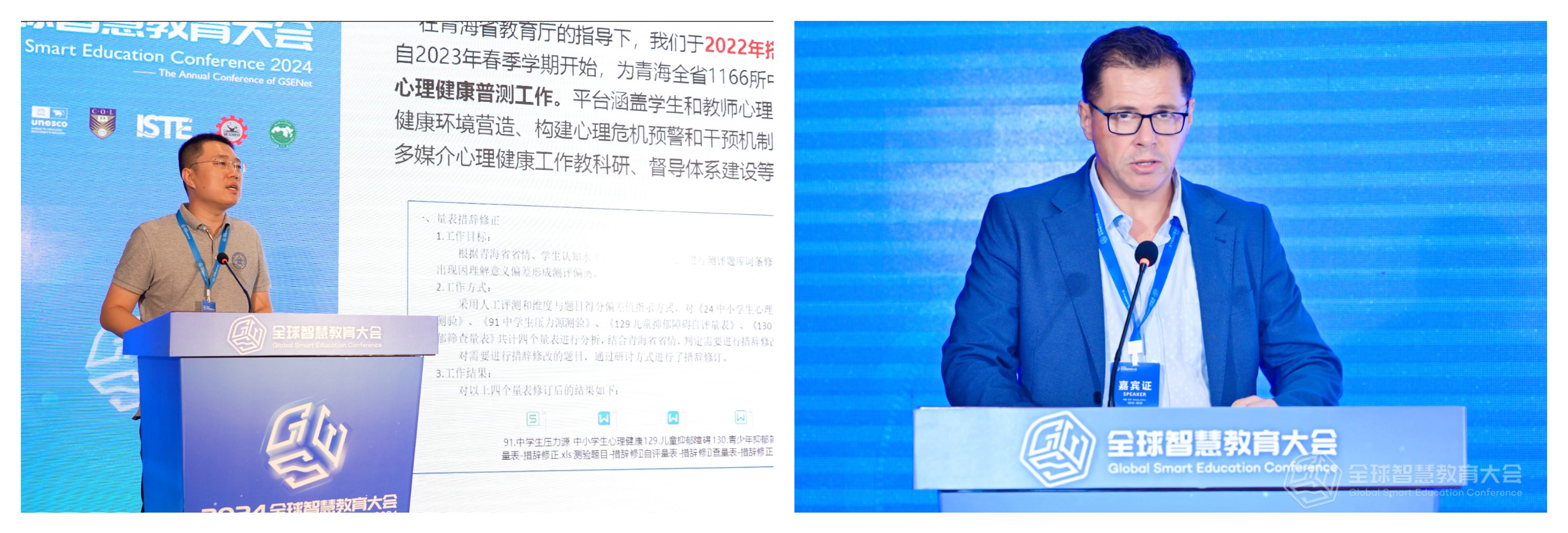
Mr. NAN Hao, CEO, Beijing Normal University · Jingshi Ruidao (Left)
Prof. Srdjan Dusanic, Dean, Faculty of Philosophy, University of Banja Luka, Bosnia and Herzegovina (Right)
Prof. ZHOU Mingming, Associate Dean of the Faculty of Education, University of Macau, presented a report titled Growing Up Digital: Empowering the Young Generation. Prof. ZHOU shared her views on how digital technologies empower the young generation. Her speech underscored the importance of a digital competence framework. She held that digital technologies should be applied throughout the course of education, from kindergarten to college, to support student learning and development.
Prof. CHEN Liangying from the Central China Normal University gave a speech titled Personalized Intelligent Intervention for Children with Autism Spectrum Disorder. She presented smart education interventions for kids with autism, with a focus on how intelligent technologies can be used to improve the social skills and quality of life of children with autism.
Prof. CHEN Liangying from the Central China Normal University gave a speech titled Personalized Intelligent Intervention for Children with Autism Spectrum Disorder. She presented smart education interventions for kids with autism, with a focus on how intelligent technologies can be used to improve the social skills and quality of life of children with autism.
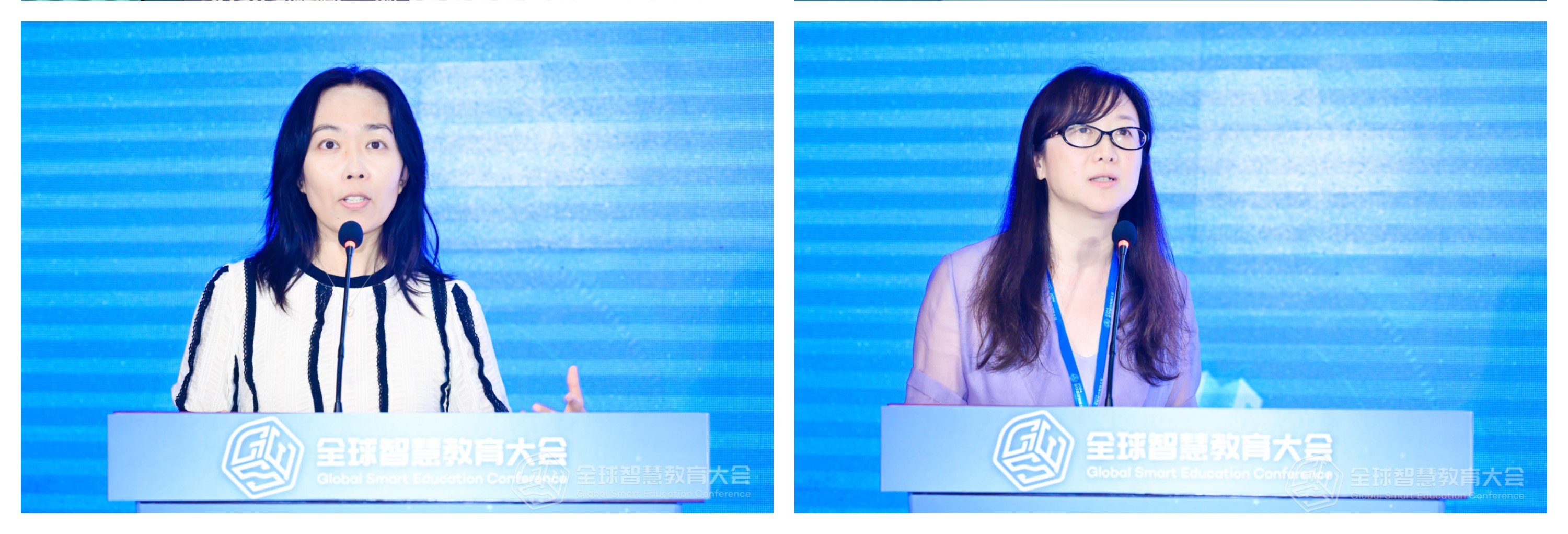
Prof. ZHOU Mingming, Associate Dean, Faculty of Education, University of Macau, China (Left)
Prof. CHEN Liangying, Central China Normal University (Right)
WANG Shenglong, Director of Educational Science Research Office, Jiangning District, Nanjing, China, gave a report titled Nurturing the Mind, Guiding the Heart: Sharing Work Experience in Mental Health Education from the Jiangning District of Nanjing. Mr. WANG briefed the audience on novel initiatives adopted by Jiangning District in mental health education, and stressed the important role of family-school-society collaboration in promoting student mental health.
Mr. FAN Lianwei, Deputy Chief Engineer of the Institute of Dataspace, Hefei Comprehensive National Science Center, delivered a speech titled AI+: Helping Us Better Understand Children — Continuous Monitoring and Care for Adolescent Mental Health. He explained how AI technologies could be leveraged to realize continuous monitoring for adolescent mental health, and help parents and teachers better understand and care for kids.
Mr. FAN Lianwei, Deputy Chief Engineer of the Institute of Dataspace, Hefei Comprehensive National Science Center, delivered a speech titled AI+: Helping Us Better Understand Children — Continuous Monitoring and Care for Adolescent Mental Health. He explained how AI technologies could be leveraged to realize continuous monitoring for adolescent mental health, and help parents and teachers better understand and care for kids.
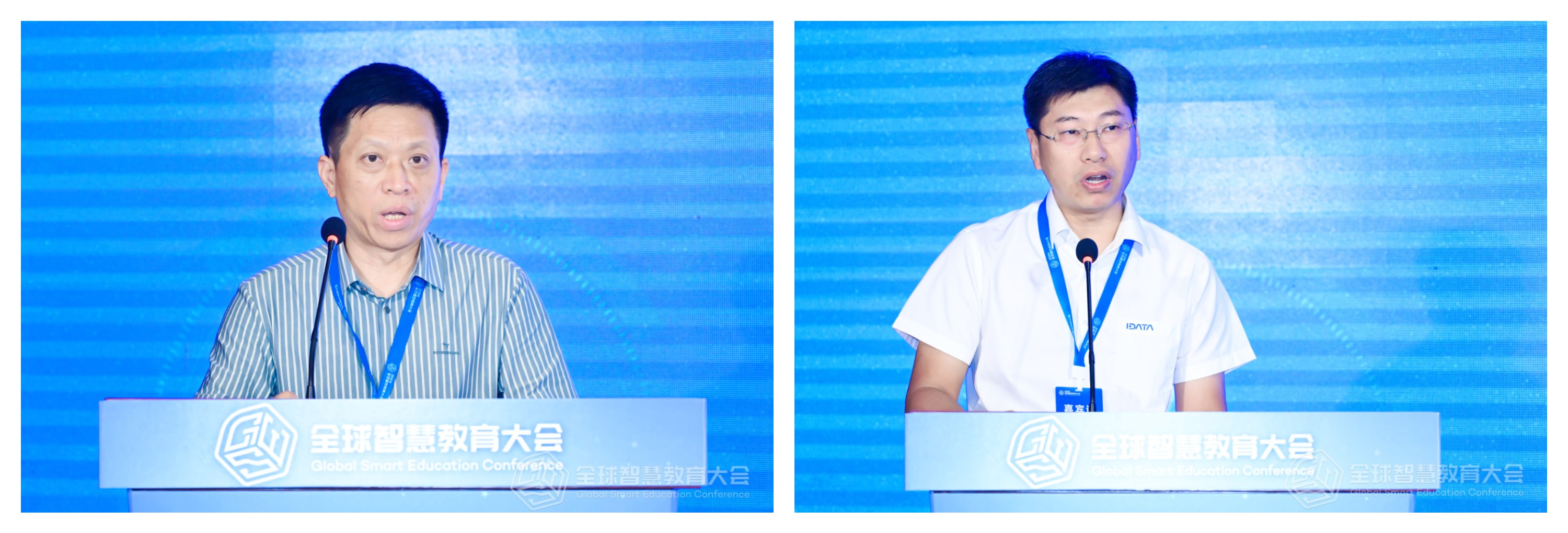
Mr. WANG Shenglong, Director, Educational Science Research Office, Jiangning District, Nanjing, China (Left)
Mr. FAN Lianwei, Deputy Chief Engineer, Institute of Dataspace, Hefei Comprehensive National Science Center, China (Right)
Prof. FANG Haiguang from Capital Normal University, China, gave a speech titled Development and Practice of Curriculum Projects for Elite Youth Talent in Artificial Intelligence Education. He analyzed how the development and practice of AI courses could be used to develop the creativity and comprehensive quality of adolescents, and presented the specific achievements of and challenges facing AI curriculum development at the K12 stage of education.
Ms. ZHENG Lanqin, Associate Professor at Beijing Normal University, presented a report titled Collaborative Learning Empowering the Physical and Mental Development of Adolescents. She emphasized the importance of collaborative learning in improving adolescent mental health, and put forward ways to boost the emotional management and psychological resilience of adolescents through collaborative learning.
Ms. ZHENG Lanqin, Associate Professor at Beijing Normal University, presented a report titled Collaborative Learning Empowering the Physical and Mental Development of Adolescents. She emphasized the importance of collaborative learning in improving adolescent mental health, and put forward ways to boost the emotional management and psychological resilience of adolescents through collaborative learning.
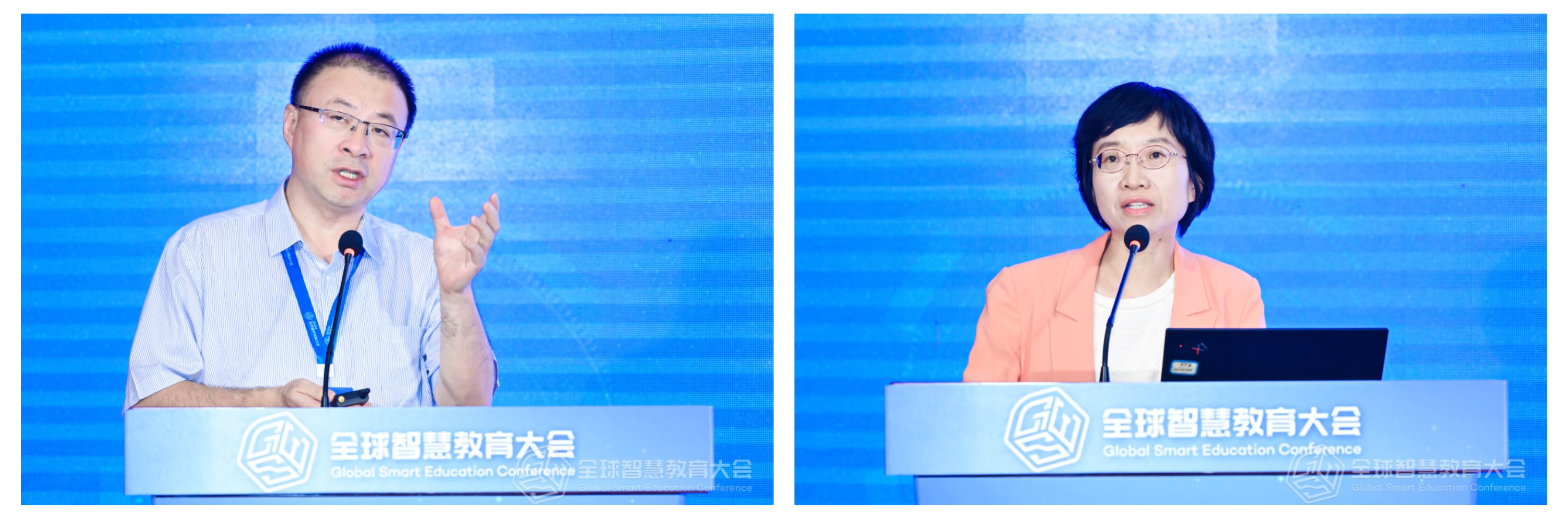
Prof. FANG Haiguang, Capital Normal University, China (Left)
Ms. ZHENG Lanqin, Associate Professor, Beijing Normal University (Right)
Ms. TAO Meiyu, Head of the Art Teaching and Research Group at Beijing Emerald City Primary School, gave a speech titled Digital Technology Expanding New Horizons in Aesthetic Education: A Study on the Application of Digital Aesthetic Education at Beijing Emerald City Primary School. She shared the effects of leveraging digital technology to improve aesthetic education, and adopting innovative practices in music, art, and other courses to help students better understand and experience art education.
Mr. HUANG Chao, Secretary of the CPC Committee of Shuangliu Middle School, delivered a speech titled Digital Empowerment in Middle School Mental Health Education: The Practice of Shuangliu Middle School. He described how Shuangliu Middle School enhanced the effectiveness of mental health education through digital platforms and smart campus development.
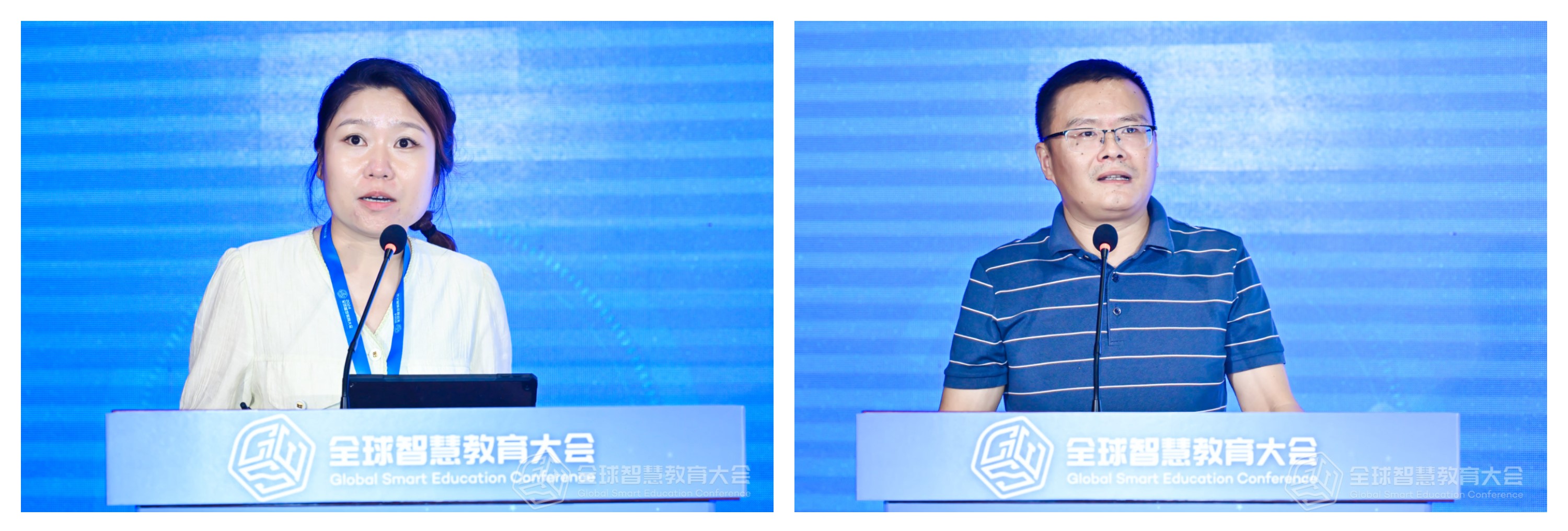
Ms. TAO Meiyu, Head, Art Teaching and Research Group at Beijing Emerald City Primary School (Left)
Mr. HUANG Chao, Secretary of the CPC Committee, Shuangliu Middle School, Sichuan Province, China (Right)
This forum was co-hosted by the Faculty of Psychology at Beijing Normal University, the Smart Learning Institute at BNU, and Jingshi Ruidao. It was moderated by Mr. Tigran Epovan, Chief of the Unit of ICT in Health Education, Institute for Information Technologies in Education, UNESCO, and Prof. CHENG Li from the Institute of Special Education, Faculty of Psychology, Beijing Normal University.
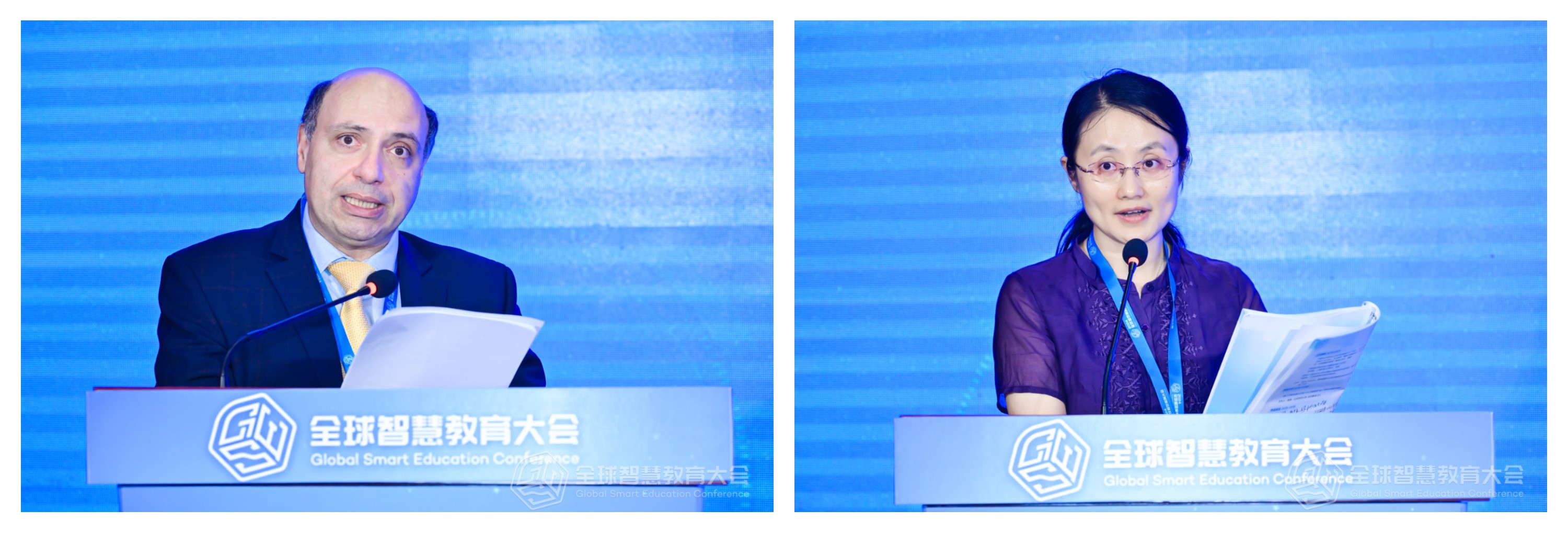
Mr. Tigran Epovan, Chief, Unit of ICT in Health Education, Institute for Information Technologies in Education, UNESCO (Left)
Prof. CHENG Li, Institute of Special Education, Faculty of Psychology, Beijing Normal University (Right)

